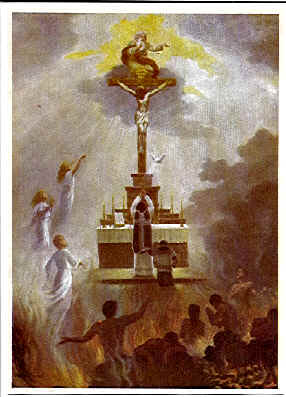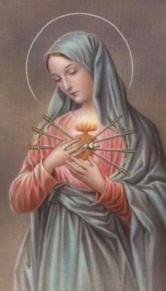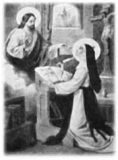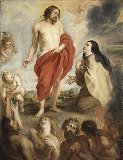Gregorian Mass

The Origin of the Gregorian Mass
These Masses are also called the Thirty Masses of St. Gregory, because the pious custom seems to trace its origin back to this great Pope. A Religious, named Justus, had received and kept for himself three gold pieces. This was a grievous fault against his vow of poverty. He was discovered and excommunicated. This penalty made him enter into himself, and some time afterwards he died in true sentiments of repentance. Nevertheless, St. Gregory, in order to inspire the brethren with a lively horror of the sin of avarice in a Religious, did not withdraw the sentence of excommunication. Justus was buried apart from the other monks, and the three pieces of money were thrown into the grave while the Religious repeated together the words of St. Peter to Simon the Magician, “Keep thy money to perish with thee.”
Some time afterwards, St. Gregory, judging that the scandal was sufficiently repaired, and moved with compassion for the soul of Justus, called the Procurator and said to him sorrowfully, “Ever since the moment of his death, our brother has been tortured in the flames of Purgatory. Through charity make an effort to deliver him. Go then and take care that from this time forward the Holy Sacrifice be offered for thirty days. Let not one morning pass without the Victim of Salvation being offered up for his release.”
The Procurator obeyed punctually. The thirty Masses were celebrated in the course of thirty days. When the thirtieth day arrived and the thirtieth Mass was ended, the deceased appeared to a brother saying, “Bless God, my dear brother, today I am delivered and admitted into the society of the saints.”
Since that time the pious custom of celebrating thirty Masses for the dead has been established.
There is perhaps no better way to let our loved ones - living and deceased - know that we are thinking of them than to celebrate the Eucharist in their name. The sacrifice of the Mass consists in the offering of the Body and Blood of Christ to God the Father. During the Consecration the Body and Blood of Christ become present on the Altar and available for us to offer them to God.
There are three different ways in which you can ensure that a loved one is remembered: Mass Offering, Spiritual Association Perpetual Membership and Gregorian Masses.
The Gregorian Mass is a series of thirty Masses offered up on thirty consecutive days for the repose of a particular person in purgatory. It is based on a tradition started by Pope St. Gregory the Great who saw the soul of one of his friends released from Purgatory after the 30th mass.
The Sacred Congregation of Indulgences has declared that "the offering of thirty Gregorian Masses has a special efficacy for obtaining from the Divine Goodness and Mercy the deliverance of a suffering soul, and is a pious and reasonable belief of the Faithful" (Rescript, 1884).
"And I promise you that whoever gives a cup of cold water to one of these lowly ones...will not want for his reward." (Mat 10:42)
If you are interested in having a set of Gregorian Masses said for a deceased loved one, please contact us for further information.
EMAIL: holysouls@att.net








0 Comments:
Post a Comment
<< Home